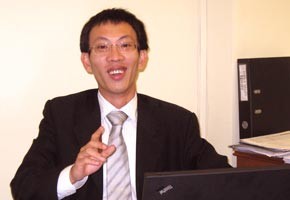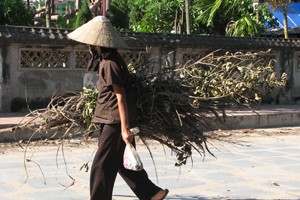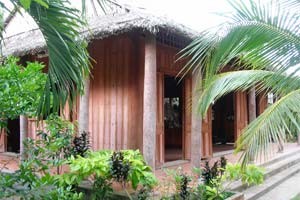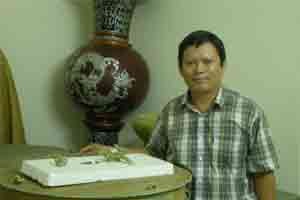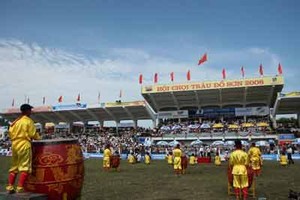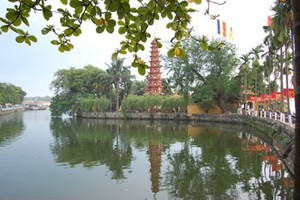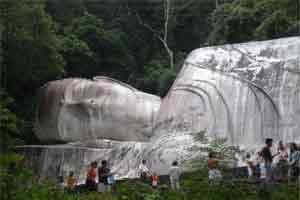A hot summer afternoon is not a rarity in Ho Chi Minh City, and garden cafes are plentiful as well. But this particular summer afternoon, we were in for a very special experience.
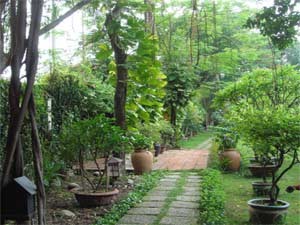
We were at the Minh Tran garden to attend a Japanese tea ceremony.
From the din of the city in Tan Binh District, entering the spacious green garden is definitely like stepping into another world.
At the gateway to the Minh Tran garden stands a house built in the ancient Hue style, with a sophisticatedly carved wooden door and a pair of dragons engraved on its roof. Near the house is a small lotus pool.
The yesteryear feeling from this house is magnified when we see a stilt-house flickering behind green shadows.
The tea ceremony is conducted in a small room in this stilt-house by two Japanese specialists, for an audience of both Vietnamese and Japanese guests.
In the room is a square platform covered with a tatami – a Japanese mats - on which an electric cooker with its ceramic case, and a traditional cast-iron teapot are placed elegantly. Strips of fabric hang from the wall as a backdrop to the ceremony.
Seemingly effortlessly, the room creates the authentic ambience of a living room in a Japanese house in the old times. The single difference is that it is situated on the lower floor of a stilt-house with its wall made of glass and its columns made of wood.
The two Japanese specialists – a mother and a daughter dressed in beautiful kimonos – enter the room. The girl holds a small lacquered box in her hand, from which she gently takes out the “tools” necessary for brewing tea – a teapot, a wooden scoop, a bamboo “broom” to stir the tea, a set of tea cups and a small wiping cloth.
After putting each item on the platform with deliberate care, she helps her mother through the steps of a tea ceremony.
Watching them at work, we get the strong feeling that the simplest things may contain the most beautiful significance in life, and that the cultural language is a magical bridge to link people of different nations from all over the world.
Moments later, the sweet fragrance of Japanese tea pervades the small room. As if on cue, it has begun raining lightly outside, and feeling of cozy, meditative comfort is heightened.
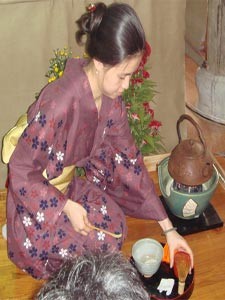
Before pouring out the tea, the host of the tea ceremony offers guests small pieces of wagashi, a cake made with rice powder, wheat flour and beans. They are shaped as butterflies, nightingales, cherry-blossoms and other beautiful things in nature.
The ceremony has its effect on us. We are more mindful of the subtle fragrances and flavors of the tea, as our sipping itself seems to become ceremonial.
We feel that we can come here again, and it will feel equally special every time.
Dynamic owner
It is surprising to learn that peaceful garden in Ho Chi Minh City is the initiative of a dynamic scholar and entrepreneur.
Nguyen Tri Dung, an overseas Vietnamese, left Ho Chi Minh City to study in Japan when he was 18, and went on to get a doctorate in economics in the country.
Before 1975, he had participated in movements to support Viet Nam and since the war ended he has returned to the country frequently.
Surrounding the garden are evidences of Dung’s industriousness and entrepreneurial drive. The Tri Dung Enterprise Administration School, the Minh Tran Hi-tech Electronics Company, and the Network for International Cooperation and Development are all facilities that Dung has invested in.
For his contributions to the country, he was conferred the “Vinh danh nuoc Viet” (Viet Nam Glory) title in 2005.
Dung has also translated a memoir written in Japanese by Honda Soichiro (the founder of Honda) into Vietnamese with the title “Bien giac mo thanh suc manh di toi” (Turning the dream into strength moving forward).

